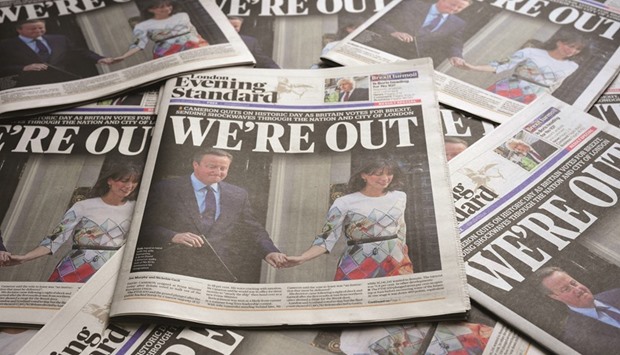The historic vote in the United Kingdom to leave the European Union is bound to have repercussions far beyond the European continent. This includes implications for the GCC states who will now find themselves having to deal with a more fractured Europe and an EU institution struggling to define its purpose in the wider integration process.
On the foreign policy front, the vote signifies a return to classical nation-state power politics with the EU losing its momentum as a voice for diplomacy and co-operation.
The immediate consequences will be felt within Europe first, of course.
While the process of separating the UK from Brussels will be a complicated and prolonged one, the vote is certain to provide further impetus for European separatism. Nationalist forces in countries like France, Germany, Poland, Hungary, etc will see themselves confirmed by the British leave vote and as a result intensify their own campaign against Brussels and against further European integration.
With issues like immigration on the top of agenda in most European countries, parties like the French Front National and the Alternative fur Deutschland (AfD) in Germany, could see their poll prospects rise further, a worrisome development, given the fact that both France and Germany will hold national elections in 2017.
The European project has always succeeded or fallen short based on the strength of a solid German-French understanding on the way forward for Europe. This alliance, however, is weak rather than than strong at the moment. The result is an EU in a profound period of doubt and declining confidence.
With the UK now set to leave the European Union, it will be incredibly difficult to insert a new sense of momentum unless Paris and Berlin can quickly regain their footing and agree on a comprehensive agenda going forward. At the moment, this does not appear to be the case.
The GCC states have always dealt with Europe from two perspectives. On the one hand, there are the numerous bi-lateral relationships which each GCC state fosters with their European counterpart.
This equation is likely to remain although the GCC states will have to deal with a UK that is now taking on a different sort of European identify.
Especially on foreign policy and defence matters, it will no longer be possible to assume that the UK and other European countries are following similar approach when it comes to relations with third party countries.
Instead, differences will become accentuated, a reality that the GCC states need to adjust to.
A more direct impact will be felt in GCC-EU relations where the EU finds itself in a much weaker position at a time when it was just celebrating some foreign policy successes, for example, in the deal over Iran’s nuclear programme.
The formula of the EU/E3 (the European Union as one actor alongside the three main European powers of France, Germany and the UK) +3 (Russia, China and the United States) that was seen a model for future diplomatic negotiations is now no more.
The move by the UK further complicates the process of maintaining common European positions when it comes to critical issues such as relations to Russia, the crisis over Syria, how to deal with Iran and Turkey, or responding to the current turmoil in the rest of the Middle East.
On all fronts, the GCC states will find themselves having to deal with sets of European actors rather than a relatively coherent EU position.
Eastern European countries like Poland and Hungary will likely toe their own foreign policy prerogatives rather than follow the weak lead out of Brussels.
The trend of individual policies, something that was already visible in terms of the refugee crisis over the past year, will be strengthened.
On issues such a combating terrorism, countering money laundering and regional issues such as Syria, Iraq, Yemen and Libya, all areas in which GCC-EU relations have grown in recent years, the GCC states now have to deal with the EU and the UK as two separate entities. This makes the policy co-ordination process complicated and difficult.
Finally, GCC-EU relations will be impacted from an integration point of view. For many years, the EU served as a model for the GCC pursuing its own integration process, most recently reflected in former King Abdullah’s call moving the GCC from co-operation to union.
But with the EU increasingly seeing its integration path obstructed by various forces, this model character has lost much of its lustre. The UK vote further dampens the prospects that an integration momentum can be regained any time soon.
The vote to leave the European Union leaves the Gulf with a more complicated European partner to deal with. Rather than moving towards more concerted efforts at co-operation and common positions, the GCC states will find a European continent characterised by increasingly diverse policies when it comes to its foreign policy with direct implications for the Middle East as a whole.
A period of adjustment will be required accompanied by a new degree of uncertainty.
- Dr Christian Koch is director of the Gulf Research Centre Foundation in Geneva.

people
